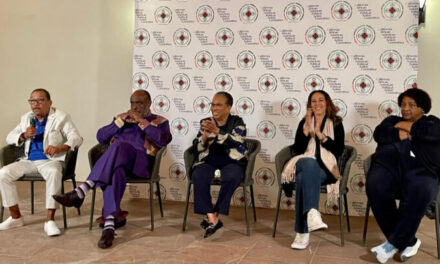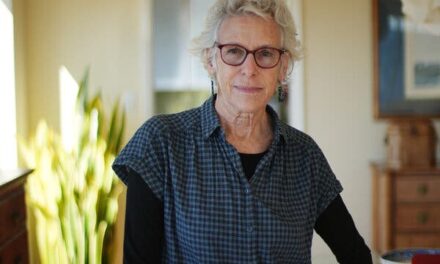Over the past few weeks, I’ve written a lot about violence. Hell, it’s been a theme of my career. Violence is a force that shapes our lives — who gets to wield it, who has to defend against it and who manages to avoid it altogether.
Amid a rise in anti-LGBTQ+ legislation and a spike in hate crimes, I wrote about the moral case for LGBTQ+ people taking up arms to defend themselves. I wrote about why men kill women’s plants, often in expressions of rage and aggression. And I wrote about the hesitancy to defend Black women who are victims of public violence.
I don’t have all the answers, but many of you wrote in with your own thoughts and stories, some of which I’m sharing below. (They have been edited slightly for length and clarity.)
On LGBTQ+ people getting guns to defend themselves
I’ve got to say, I expected to see more comments disagreeing with me on this one, or arguing that the answer to guns and hate is not “give good LGBTQ+ people guns.” But that turned out not to be the case …
Stephanie Suesan Smith, Dallas: I recently got my concealed-carry license. For too long, we have let right-wing bigots shoot us in our safe spaces. It is time to shoot back!
Gary A. Rintelmann, Wisconsin: I purchased a handgun and a rifle last autumn, after not having fired a weapon in 26 years (training courtesy of the U.S. Army). After four years of [President Donald] Trump, his followers, Jan. 6 and everything since, my rationale was: “I don’t want the bad guys to have all the guns.” Not exactly an enlightened way of looking at things, but I do feel more empowered because I have the firearms and practice with them regularly at a local range.
Mary Orcutt, Arroyo Grande, Calif.: Your article about LGBTQ+ folks arming themselves was right on. I hate guns, but I am glad when I hear that people who are threatened are arming themselves to feel safe. The belligerents have to be answered in their own language.
Paul Kellett van Leer, D.C.: As a gay-identifying psychoanalyst practicing in D.C. with a largely gay-identifying analysand base, I was moved by your article. The horrors on which you reflect have become insistent preoccupations and anxieties. … I have no doubt that those reading the article will find a certain solace in its echoes of their experience.
On interrupting public violence against women
Bernard Fulton of D.C. asked: “In response to your call for intervention in violence against Black, or any, women, could you tell us how the situation was defused? Could you also ask your readers for any stories of successful intervention that they may have? I think examples of success would be very helpful.”
Indeed, I got a lot of responses — from men and women — about various attempts at defusing situations …
SWer, Texas: It is possible to create distractions that interrupt the dynamic of the altercation. For instance, set off your car alarm. Those are so annoying that the aggressor might come out of their rage. Knock the other cars and set off a lot of alarms. Keep honking your horn. Another strategy is to become a person in distress yourself: Keep asking for help, make your distress something other people, including the person harassing the victim, need to respond to. I find this helps greatly as a gray-haired old lady. I have even asked people fighting for directions, which is so distracting that they stop the fight and help me. The point is to create a situation in which the aggressor is not in charge — not through confrontation, but through misdirection.
Kay Hoffman, Burlington, Wash.: I am 79. When I was young and being hit on by creeps, I never dared to be rude. The goal was to charm and placate the creep until I could safely get away and to thereafter avoid this person like the plague. I would give a fake phone number to appear agreeable but never, ever be rude or defiant or hateful. It was self-protection.
Tina C. Hinton, New Lisbon, Wis.: After my daughter experienced a scary, unnerving incident walking down a street in Denver, I funded a self-defense class for her. She became trained in Krav Maga, an Israeli martial art that focuses on real-life situations and efficiency of action. I went to one class with her. They talk about going up to the line of breaking the law, leaning over but not crossing it. Women are taught to be polite. Be nice. Krav Maga taught my daughter how to confront perilous situations and reinforced my directions to not care about being “nice.” It’s one of the best things I’ve helped her do.
Patrick, Frisco, Tex.: Your article about men attacking women for little more than injured ego reminded me of an anecdote from 30 years ago. A group of friends and I gathered at a park late one night to drink and clown on each other. There was another car in the lot, and a woman was chased out by presumably her date. He grabbed her by her hair and started punching her in the face. We intervened first by telling him to stop. He told us he would whoop all of us, which was absolutely the wrong thing to say. As his beatdown commenced, I’ll never forget that the woman we stood up for yelled, “You ******** leave him alone!” Everybody stopped. To this day, I don’t get it. But I’ve since seen several instances where the victim protects the attacker. Police often say domestic violence calls scare them the most because everyone is wound up.
James Fetter, North Canton, Ohio: Your article reminded me of a situation several years ago in which I, a White man who happens to be blind, did, in fact, intervene to put a stop to the sexual and verbal harassment of a Black woman whom I did not know by a White male stranger, whom I had no desire to know. The situation was not violent, and no violence was required to defuse it. Instead, all I had to do was walk behind the sexual harasser, put my hand on his shoulder and quietly ask him to leave the table where we were all sitting. I am not sure if I would intervene in a violent situation involving strangers, because I have no idea whether the aggressor is armed, and I barely know how to throw a punch, let alone win a street fight. For that matter, I am not sure whether I would intervene now as I did then, because it seems that people are being shot and killed over nothing all the time these days.
Kristi Griner, Alexandria: In 1990, I was 19 and working at a Wendy’s. Closing shift, drive-through window, and our parking lot butted up against other businesses’ lots. Around 11 p.m., I saw a couple in the lot across from me. They were arguing and he was shouting at her. He finally slapped her down to the ground and continued to hit her. I yelled, “Call the cops!,” flew out the back door and across the lot, and full-bore tackled him. Knocked him down, grabbed her hand and pulled her back into the restaurant. Cops arrived, took statements and took the guy in. I was almost fired on the spot, but the woman told my boss, “Don’t you dare! She helped me!” I’m 5-foot-8 and have always been strong. Have fought more than one man who needed it.
Rhonda Smith, Silver Spring: On a practical level, women in general must learn how to effectively defend themselves. Women of color in particular, it seems, must do so. I have met two older Black women, one in her late 70s and one in her early 90s, who had firearms for protection. I am Black and in my early 60s and now lift weights and do cardio so I can defend myself if necessary. I am thinking about buying a pistol, not because I like guns but to use if the need ever arises. We can’t necessarily wait for others (people or agencies) to rescue us.
Do you have questions, comments, tips, recipes, poems, praise or critiques for me? Submit them here. I do read every submission and may include yours in a future version of the newsletter.




